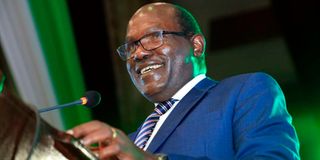Is IEBC an honest victim or a conspirator?

Independent Electoral and Boundaries Commission Chairman Wafula Chebukati making his address on June 15, 2021 at Bomas of Kenya during the electoral body's strategic plan.
What you need to know:
- The Independent Electoral and Boundaries Commission (IEBC) is significantly cash-strapped.
- Questions have also been asked about the IEBC’s capacity to plan.
The Independent Electoral and Boundaries Commission (IEBC) is in familiar territory and that is really bad news for anyone interested in Kenya’s 2022 General Election being free, fair and credible. And that should be all Kenyans and their friends.
Less than a year to voting day (August 9, 2022), critical activities that should have been finalised are stalled, courtesy of disputes over procurement. Last month, the Public Procurement Administrative Review Board stopped the IEBC from awarding the hugely lucrative ballot paper tender to Greek firm Inform P Lykos (Hellas) S.A.
The complainant, Africa Infrastructure Development Company, is allegedly unhappy that IEBC settled on only one company to supply the ballot papers, the register of voters, the election results declaration forms for polling stations, and also those for the constituency, county and national tallying centres. I am not sure if such a decision is illegal but there might be a case of IEBC over-concentrating its risk if the contract were to be breached for non-performance. The exposure would be too high.
The tireless public litigant Okiya Omtatah meanwhile is also in court challenging the IEBC over procurement of ballot papers. He alleges a contestable plan to award De La Rue Kenya and EPZ Ltd for supply of ballot papers through a direct tender. This is apparently on account of a contract awarded a year ago and is set to expire at the end of the year.
Again, it would appear to be quite dumb for the IEBC to invite fresh tenders for the supply of ballot papers during the subsistence of a contract to supply the self-same ballot papers. But it will not be the first time that the IEBC has shot itself in the foot – the most extreme moment being the embarrassing indictment from the Supreme Court during the nullification of the 2017 presidential result. It left egg on the IEBC’s face that won’t be wiped off if its performance so far towards the 2022 General Election is any indication.
Cash-strapped
It has even bigger problems. The IEBC is significantly cash-strapped, a matter compounded by the fact that it can no longer depend directly on the generous support that it has always got from the UNDP programme that supports electoral processes. Unlike in the past where it could discuss and receive support directly from donors, any request for assistance now must go through the Foreign Affairs Ministry.
IEBC chairman Wafula Chebukati said in August that his commission required about Sh41 billion for the general election, including about Sh600 million to finance Covid-19-related health protocols. Treasury has allocated Sh26.3 billion, leaving a significant financing gap of Sh14.577 billion that IEBC must raise from other sources.
The impact is already being felt. The planned two-round registration of new voters was reduced to one, which has already been done, with abysmal results. While it expected to register about six million new voters, less than 1.5 million actually registered, not least because of the very tepid activation through media advertisements and other forums and activities. Its capacity to enforce important regulations like observance of election financing rules and monitoring fidelity to other ethical and professional rules of conduct is severely compromised.
It can only watch as candidates splash cash that must be illicit, and in the process exceed the allowed spending limits. It can merely watch as aspiring candidates bribe voters (in the name of facilitation) with brazen impunity. It remains a bystander as aspirants illegally conduct campaigns well outside what should be the gazetted electioneering period.
Considering how perpetual this lame-duck state has been, one has to wonder whether it is deliberate. Questions have been asked about the IEBC’s capacity to plan, for example. Since it has the electoral cycle dates well defined, why does it start procurement processes so close to the date of the event? It also knows, with utmost certainty, that because of the tender amounts involved, there will always be a dispute whichever way its decision goes. The excuse that it could not have acted much earlier because of the commission’s quorum issue is untenable because this has only become alive in the wake of the BBI court pronouncements.
The IEBC’s demeanour makes it difficult for its few sympathisers to remain believers because of this highly dubious handling of what should be routine activities. It gives credence to those that would rather see a conspiracy to create crisis situations that naturally seed corruption and lead to theft, plunder, mismanagement or even worse. An election that cannot meet the threshold of free, fair and credible.
The writer is a former Editor-in-Chief of Nation Media Group and is now consulting. [email protected], @tmshindi





